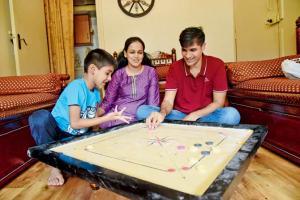Prince William and Kate Middleton have turned the palace into a no-tablet zone for their kids. But is it a practical option? A Mumbai family is walking the talk

The Duke and Duchess of Cambridge have managed to keep much of their life private. But what sources close to the royal couple don't mind divulging to the media is that as the three-month-old Prince Louis grows up, he will have the same rule to adhere to that Prince William and his wife Kate have set for their older children - no tablets in the palace. The reason, reports mention, is the fact that they want Prince George, four, Princess Charlotte, three, and their youngest son to have an active imagination and spend more time outdoors.
ADVERTISEMENT
The outdoors, in this case of course, is sprawling lawns, where the royal children can play without a worry, while indoors, they have adequate avenues - and help - to keep themselves meaningfully engaged. But in a fast-paced city like Mumbai, where space and time come at a premium and both parents in several families are working professionals, the temptation to hand your kid the mobile so you can feed him in peace, or just take a breather, can be hard to resist.

Case in point
Not so much for the Mulyes, whose screen time rules for their son Vismay have been so clearly laid down since he was a toddler that when we get talking to the six-year-old about gadgets at their Dadar residence, the first words he utters are "The mobile is not a toy."
"Till he turned one, we made sure that he had zero exposure to any kind of screen. Even in his second year, the screen time was negligible," says Manjusha Mulye, 36, senior manager in the finance department of an IT firm. "But as he grows up, we are seeing to it that we don't go to extremes by putting a blanket ban on technology use," explains Salil Mulye, 36, finance professional in a multinational bank. And to do so, they allow Vismay to watch no more than two videos of two minutes each at a time. "We keep tabs on the content of the videos and ensure that he is exposed to something meaningful. Every morning, for instance, we let him watch the highlights of the previous night's football matches. We don't want him to miss out on what's happening around him," he adds.

The Mulyes at their Dadar residence. Pics/Suresh Karkera
Child and adolescent psychiatrist Pervin Dadachanji corroborates this approach. "Moderation is the key here. Banning activities never works because kids will find a way around it, and as they grow older, it will only make them rebellious. What's equally important is thinking things through from the beginning. Rules need to be set before giving kids a privilege, not after," she elaborates, adding, "The problem is, we use the iPad or the phone as babysitters."
The tricky meal time
Which brings us to the question of how the Mulyes avoid the all-too common scenario of a child fixated on a cartoon clip playing on a tablet, while he is fed food. "As working professionals, we are away from Vismay for anywhere between 10 and 12 hours. So when I am back from office, I crave for some undisturbed time with him.
And that's when we weave in his dinner. Instead of giving him 30 minutes of passive screen time, I read stories to him, which have greater scope for interaction," shares Manjusha.
This anti-social aspect of technology is what Dadachanji advises parents to be wary of. "Gadget-based visual content offers so much stimulation that it reduces the child's attention span. It is always easier for a kid to go back to studies when he is back home after playing in the outdoors than after having watched something on the phone. Including some form of physical activity in your kid's routine is crucial," she says.
But keeping a young, impressionable child meaningfully engaged for all his waking hours is no mean feat. That's where the example set by the parents guides the child even in their absence, Dadachanji explains. "We avoid using our laptops, or being on the phone too much at home. In fact, we have told Vismay to raise a red flag if that happens," says Salil, adding that their favourite after-dinner activity is playing carom or locating places they have visited on the globe.
"It's about laying down the rules and sticking to them as a family," says Manjusha. "That we are doing something right comes through on occasions when Vismay can't make sense of why a fellow playmate wouldn't put the tablet away and run with him instead."
Inputs by Dalreen Ramos
 Subscribe today by clicking the link and stay updated with the latest news!" Click here!
Subscribe today by clicking the link and stay updated with the latest news!" Click here!






